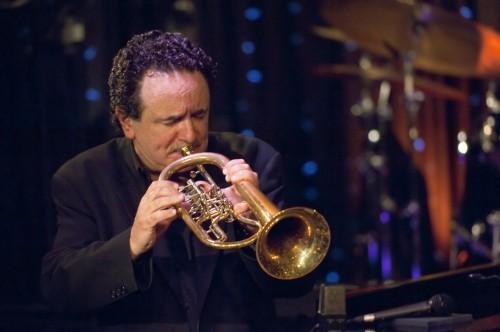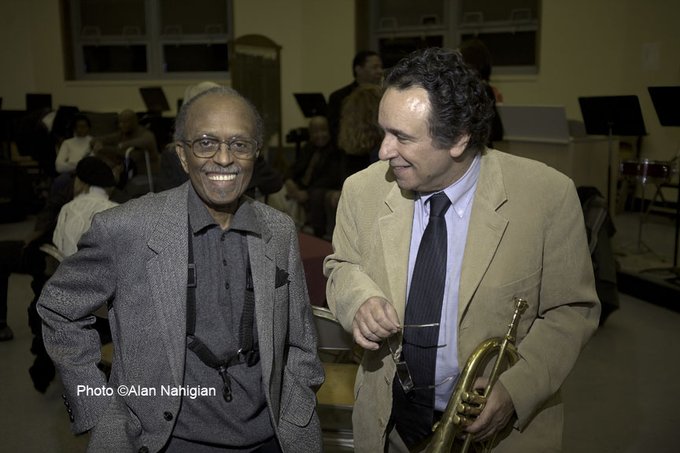Claudio Roditi, whose lyrical poise and burnished warmth on trumpet and flugelhorn helped make him one of the most accomplished jazz musicians from Brazil, died on Jan. 17 at his home in South Orange, N.J. He was 73.
His wife, Kristen Park, acknowledged his death yesterday on a GoFundMe page established to help support his treatment for prostate cancer. “He didn’t like the concept of ‘battling’ or ‘fighting’ cancer,” she wrote. “He accepted it and felt it was more like something that he was just trying to live with.”
For the musicians in his inner circle — like Cuban-born clarinetist and saxophonist Paquito D’Rivera, in whose band he played for years — Roditi was singular. “To say that he was very special is redundant, because everybody loved him so much,” D’Rivera tells WBGO, speaking by phone. “He was an original without even trying.”
Roditi was celebrated for his fluent musical synthesis of bebop and Brazilian music, as exemplified by the title of his 1994 album Jazz Turns Samba. But he was adept in an expansive range of settings, from post-bop to Afro-Cuban mambo to symphonic music. His playing combined a mastery of the modern-jazz trumpet vocabulary — the dialects of Clifford Brown and Lee Morgan, among others — with the essence of saudade, a distinctly Brazilian expression of melancholic longing.
That mingling of traits can be heard throughout Roditi’s discography as a leader, spanning more than 35 years. Here is a perfect example, from the 2009 Resonance release Brazilliance X4, featuring Roditi’s longtime compatriots Helio Alves on piano, Leonardo Cioglia on bass and Duduka Da Fonseca on drums. (The song is “E Nada Mais,” a Brazilian standard, which the band plays as a bossa nova.)
Brazilliance X4 earned Roditi a Grammy nomination — his second, including an earlier nod for Symphonic Bossa Nova, featuring Ettore Stratta and the Royal Philharmonic. He was also part of a Grammy-winning ensemble led by one of his trumpet forbears, Dizzy Gillespie: the United Nation Orchestra, which scored Best Large Jazz Ensemble Album for Live at the Royal Festival Hall.
That recording, from a 1989 concert, was also released on video. Roditi makes a strong impression on D’Rivera’s “Samba For Carmen,” which begins at 3:25 in the clip below. (Roditi picks up the solo baton from trombonist Slide Hampton at 4:52.)
Claudio Roditi was born on May 28, 1946 in Rio de Janeiro. Because his father worked in Brazil’s coffee industry, their family moved around the country — spending significant time in places like Santos, a coastal town near São Paolo, and Varginha, in his mother’s home state of Minas Gerais.
“The first instrument I played was the table at our house,” Roditi recalled in a 1996 episode of Marian McPartland’s Piano Jazz. “Then I asked my father to get me a set of bongos, so that was the first instrument I owned.” By age 6 he was taking piano lessons from his mother’s cousin; a few years later he spotted a trumpet in a band room in Varginha, and “it was love at first sight.”
Roditi began exploring jazz in his early teenage years, inspired by trumpet heroes like Gillespie and Miles Davis. After his father’s death, he moved with his family back to Rio, where he received more formal training from noted saxophonist Aurino Ferreira.
By the mid-1960s, just as bossa nova was becoming a worldwide phenomenon, Roditi began to feel restless in Rio. He entered a jazz competition in Vienna, Austria, in ’66, receiving positive feedback from its distinguished jury, which included alto saxophonist Cannonball Adderley, trombonist J.J. Johnson, and a trumpet hero, Art Farmer. In short order, Farmer became a mentor, encouraging him to pursue a jazz career.
He began this pursuit in 1970 at the Berklee School of Music in Boston, after which he moved to New York City. He racked up prominent sideman affiliations: with Herbie Mann, Tito Puente, McCoy Tyner, saxophonist Charlie Rouse, and the German pianist Klauz Ignatzek, among others.
In D’Rivera’s band, he was originally called upon to play valve trombone — which he did for a number of years, until he declared that it was interfering with his trumpet embouchure. “I never believed him,” D’Rivera says, laughing. “I think he was just too lazy to carry around the two instruments! But I loved the way that he played any instrument.”
In fact, Roditi was known for favoring a rotary-valve trumpet, which is more commonly associated with orchestral settings than jazz. Played with key-controlled rotors rather than pistons, it’s a less flexible instrument that can produce a rich, full tone. “He found pleasure in playing the rotary valve, which for jazz music is a little more limited,” D’Rivera says. “You cannot play half-valve with a rotary, so it’s one effect less that you have with that instrument. But he didn’t seem to care. He liked the sound of the rotary valve.”
In recent years, Roditi had put renewed focus on his own compositions, featuring them exclusively on a 2010 Resonance album called Simpatico. Among those tunes is “Alfitude,” dedicated to the iconic Brazilian composer known as Johnny Alf, and “A Dream for Kristen,” for his wife, whom he met in Boston during his Berklee years.
News of Roditi’s death circulated on Sunday, just as the music world was absorbing the loss of saxophonist, composer and NEA Jazz Master Jimmy Heath. On social media, artists like trumpeter Arturo Sandoval and bassist Christian McBride observed these losses as a one-two punch, and a sad day for jazz.
Among the many times Roditi and Heath had crossed paths was a record date in 1992, for the latter’s Little Man Big Band.
On New Year’s Day, Roditi had posted a note to his GoFundMe page that reflected on his health struggles. “I always try to see a glimmer of hope in any situation,” he wrote. “It means the focus is on the present moment and all the beauty (and music!) that exists in that very moment.”



